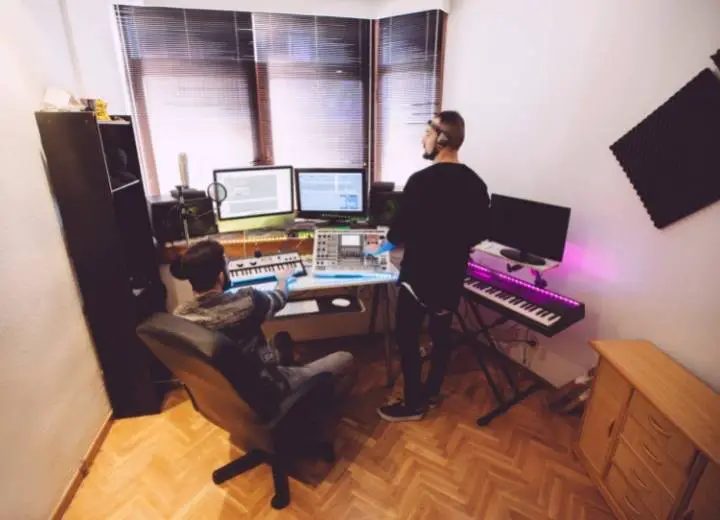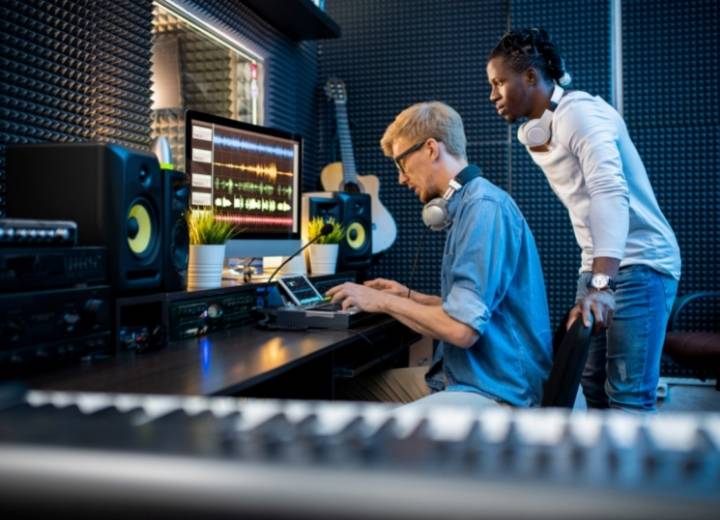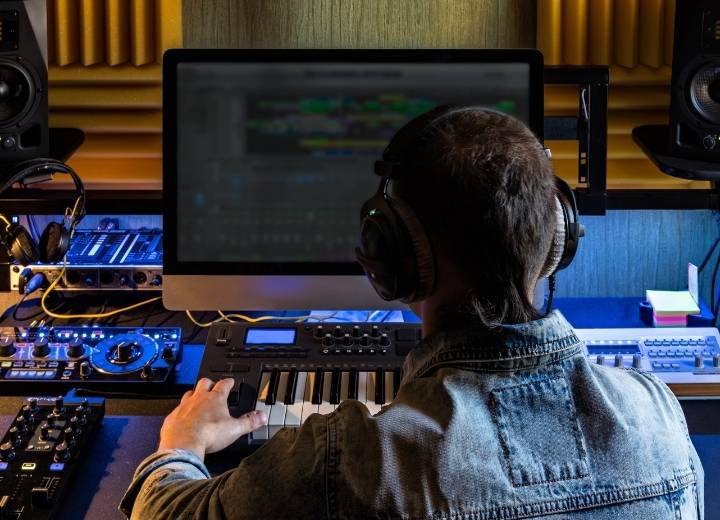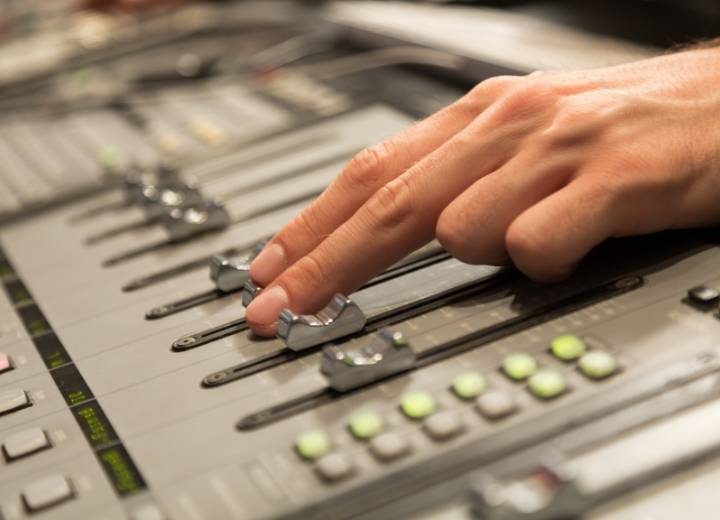
Recording Engineer vs Producer: What’s the Difference Between Their Work?
To create perfect sounds in songs, movies, or TV shows, we need a producer, recording, mixing, and audio engineer.
Each person will take on different positions in each stage. So, what will be different for each person’s job? In this article, we will provide you with all the detailed information!
Compare Producer, Recording, Mixing vs Audio Engineer’s Job?
- The producer is the decision-maker, manager, and responsible for all aspects of the final sound process.
- The recording engineer is similar to an audio engineer. They will be in charge of recording sound correctly and recording devices such as microphones or recording time.
- After the recordings are complete, the mixing engineer will mix them into an entire soundtrack. They will control the mixing unit to increase and decrease the sound and fine-tune them to harmonize better.
In each stage of creating the final sound or music, each of these people has their jobs. They do different jobs but have the same goal of making the best music.
So what is the difference in their work? Continue reading the secret below to see more!
What Does a Music Producer Do?
Every show, song, or movie has a producer. They act as the critical moderators in the entire business.
The manufacturer will be the person to control and manage the entire operation during the production period. Their goal is that the end product must be of the highest quality.
A music producer will be involved in the song-making from the beginning of everything until the song’s release. They will work with everyone involved in the song. It includes singer, songwriter, music, recording style, etc.
Music producers have a significant influence on the final product because they make all the critical decisions. They need strong work expertise and understanding of music, equipment, creativity, and leadership.
Music producers can start with good music engineers. After working and accumulating experience, they can take on this vital role in the production team.
What Does Engineer Music Do?
Physical factors such as recorders, microphones, and audio equipment all have a significant influence on songs. The sound engineer is the person who will tune and manage these issues.
They focus on technical issues in sound recording, be it during recording or mixing. Music engineers must always pay attention to the sound quality they are recording and whether the equipment is in good working order.
They are also the ones who directly edit the sound, mix the recordings and make them harmonize.
Although they are not involved in the entire production of the song, they have a significant role. The music engineer will decide how good your sound.
In the process of creating songs, there will be many different stages and tasks performed. To avoid chaos and get the job done better, they divided the music engineer into different positions. Today we will help you learn including:
- Recording Engineer
- Mixing Engineer
- Audio Engineer
#1. Recording Engineer
The recording engineer is the main person in the artist’s recording process. They must ensure that the recorded audio is of the highest quality.

Recording engineers need to maintain their equipment and stay agile.
The recording engineer is the person responsible for the recordings. They also have to adjust the audio equipment accordingly and make sure it works at its best. For example, microphones, musical instruments, cables…
Some of their recordings audio optimization work, such as noise reduction or voice with Foley factors…
Recording engineers need to maintain their equipment and stay agile. They need to make sure all recording equipment is working properly while the recording takes place. If so, they will have to fix the problem immediately so as not to affect the recording.
#2. Mixing Engineer
A mixing engineer is another important engineer who affects the perfection of the final sound. They did nothing but harmonize the recordings.
Their work takes place after the recording engineer completes the recordings. They use their talents to combine disjointed recordings into a complete piece. And they make the mixes come to life.
Naturally, after the logs are complete, they will not be perfect. Recordings will have areas where the sound is too small, too exposed, or sporadic.
Simultaneously, the mixing engineer will perform fine-tuning operations such as reducing the volume, cutting, adjusting the sound intensity… The final sound they create needs to have harmony and balance.
The primary tool they use in every job is the mixing board. Mixing engineers need to have extensive knowledge of music and instruments, especially music theory. The sensitivity to the arts is also an advantage that helps them develop better.

A mixing engineer affects the perfection of the final sound.
#3. Audio Engineers
Audio engineers are like music engineers. They perform a variety of audio roles such as recording, mixing, reproducing, and reinforcing sound.
However, audio engineers work mainly in recording studios or studios. They are different from sound engineers who are usually in charge of outdoor sound, performances, or concerts.
Recording Engineer vs Producer: How Different Work?
After a period of working and having a lot of experience, many recording engineers become music producers. It is because of this that many people mistakenly think that a recording engineer works as a producer.

Many recording engineers become music producers
Reality is not so! Although these two jobs are related and require similar expertise, there are differences between them.
#1. Work to do
While the recording engineer only needs to do the work related to capturing good sound, the producer needs to do more. A producer needs to do and take care of many different things along the way.
Engineers follow the producer’s instructions and get to work. But producers need to be more creative and find the right direction.
#2. Professional skills
If a recording engineer only needs to have a high level of sound and recording equipment expertise, producers need more than that.
Producers need a profound understanding of music, how to combine sounds, and even physical devices. They also need to have a lot of knowledge and experience to deal with various problems continuously.
Maybe the recording engineer doesn’t have to worry about the singer’s voice matching this song. But the producer needs to know precisely that to be successful.
#3. Work responsibility
Producers take care of almost all the work in the process of creating new songs. Thus, their responsibilities also spread.
They are ultimately responsible after everything is over. Whether the song succeeds or not depends on the producer.
But recording engineers are different, and they will be mainly responsible for the initial recordings. They need to record the best, most accurate sound to pass on to the mix.
Recording Engineer vs Mixing Engineer: How Different Work?
The same music engineer, but these two positions do different jobs. Mixing engineers are not involved in recording audio.
#1. Perform the work
As mentioned above, the recording engineer is in charge of recordings, sound, and recording equipment. They always want to record the perfect sound.
However, mixing engineers are not involved in recording audio. Their main job is to mix and match recordings to create the final track.
They will adjust the sound to mix discrete recordings and help them create the best tone. They needed to make the previously disjointed sounds come to life.
#2. Work execution stage
As you can see, the recording engineer will work first. They need to record the artist’s recordings as raw materials for the mixing engineer to mix.
The work of the mixing engineer usually begins after the work of the recording engineer. They will take the discrete recordings and start mixing.
In some exceptional cases, like performing on stage, they will work together. Together they are behind the scenes to control the sound.
Sometimes one person can also do these two jobs at the same time. However, to get the job done better, there will often be two different people in these two positions.
Recording Engineers vs Audio Engineers: How Different Work?
Honestly, these two positions will cause a colossal misunderstanding. It is difficult to tell the difference between these two positions in many cases.
These two positions are like one when it works together in the recording studio. Both the recording engineer and the audio engineer do the recording of the recordings.
They are all in charge of capturing the best sound, adjusting the recording equipment, and making suggestions to improve the sound.
However, when it comes to broader issues. The audio engineer will be more active than a recording engineer.

Audio engineers can take on more positions
The recording engineer will only be responsible for the sound in the recordings. They care about how well the receiver works and how the recordings sound.
In contrast, audio engineers need to take care of both the recording, mixing and equalizing or adjusting the final sound.
This means that audio engineers can take on more positions and roles than recording engineers. Of course, they will also need more specialized skills and experience.
It can say that an audio engineer is like a recording engineer, but it can do so much more!
Frequently Asked Questions
#1. Can one person take on all producer and engineer positions?
Yes. This can happen if it is someone with the right expertise. They must be experienced and perfect listeners!
However, this is rarely the case; too much work for one person will make everything too overwhelming.
#2. Is an audio engineer the same as a sound engineer?
Honestly, these two positions are utterly similar in terms of work and experience.
However, audio engineers are usually the ones who work in the studio. In contrast, sound engineers will work in live performances.
#3. Can I be a mixing engineer and producer at the same time?
Of course, you can do it if you have enough knowledge and experience. Most of the time, if you are a producer, you can be a mixing engineer.
There are many producers these days who want their mixes to be perfect the way they are. So they did the work of mixing engineers themselves.
Summary
To create perfect music, song, or sound system needs to go through many stages. Producers, recording engineers, or mixing engineers all have their roles and responsibilities.
Although they do different things, they always have one goal to create the perfect product!
